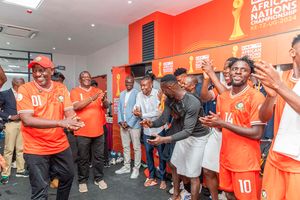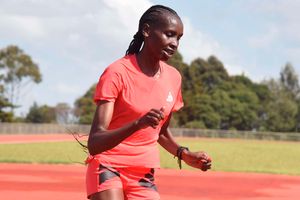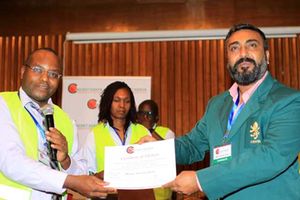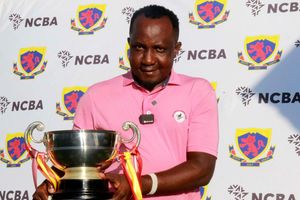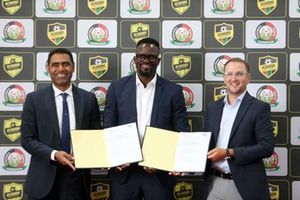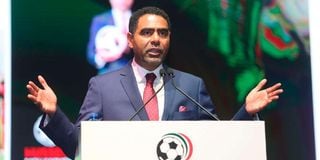
Football Kenya Federation president Hussein Mohammed.
One month into office, Football Kenya Federation (FKF) president Hussein Mohammed, who was elected on a platform for transparency, accountability and integrity, spoke to Nation.Africa.
He shared insights into the results of an audit of FKF accounts, the hiring of a permanent coach for Harambee Stars, plans to grow women’s football and the fight against gender-based violence in the sport.
He also spoke about the ongoing preparations for the Africa Nations Championships (Chan).
Here are excerpts from the interview.
Question: How have your first 30 days in office been?
Answer: To say it has been baptism by fire is an understatement. We have our work cut out for us. The first task for me and the FKF National Executive Committee (FKF NEC) was to form a team to oversee transition and to institute a forensic audit of FKF’s finances and human resources. We expect a comprehensive report at the end of this month which we will make public.
Our immediate task has been to oversee Kenya’s preparations for Mapinduzi Cup in Zanzibar, and engaging the Confederation of African Football on hosting of 2024 Chan. The mood out there is that we are on the right trajectory, and we need to be consistent but patient with the process.
Q: There have been doubts as to whether Kenya is doing enough to get stadiums ready to co-host 2024 Chan with Uganda and Tanzania. Are we ready to co-host 2024 Chan next month?
A: The government has done a lot to ensure the facilities are ready, but ensuring the quality of the tournament is the responsibility of the Local Organising Committee (Pamoja Chan 2024 and Pamoja Afcon 2027 Multi-Agency Team appointed in December 6, 2024). The government has undertaken to have the facilities and training grounds ready for the tournament in time for the kick-off, and we can see the 24-hour operation it is undertaking.
For Kenya, it is not just about hosting it, but also our performance in the tournament. We have a strong team working on these. A lot of work is going on in the background, and my deputy Mariga is handling a lot to do with 2024 Chan and the national team.
Let’s celebrate the wins, but also be patient to build a strong national team to serve us better. Chan 2024 is a launchpad for what needs to be done in 2027 Afcon. It is a proper recce for what needs to happen down the road with regard to big competitions.
Q: Francis Kimanzi is interim coach of Harambee Stars, but will Kenya have a permanent coach before 2024 Chan kicks off?
A: We made it clear that Kimanzi is the interim coach, and that remains the case. Historically, we have had a big challenge with coaches in terms of paying their dues, and we don’t want to fall in a similar trap that we have had in the past. We want to get things right, given the contractual obligations and the journey ahead.
FKF is looking for a substantive coach, and a competent technical bench to achieve our objectives. It is an ongoing process, which is why the current technical bench was appointed on an interim basis. Harambee Stars are competing in Mapinduzi Cup, but we will give a direction about the new coach in a week or so after tying up the loose ends.
Q: The resumption of FKF Premier League matches was pushed from January 3 to a later date because key committees and sub-committees at the federation like FKF Competitions Committee that handles match appeals have not been constituted. When can we expect league competitions to resume?
A: We made a decision to do things right, and sometimes that means some things have to delay. Instead of rushing and getting it all wrong, we delayed a bit so as to do things in a more sustainable way. There are sub-committees that need to take shape immediately, and that will be done in the next two days.
We have already constituted the referees committee, and we are now reconstituting the standing committees to oversee local leagues. We also need committees to handle national teams, and the National Executive Committee is aware of this. We should tie up everything in one or two weeks.
We are working on a structure to restore credibility of the local competitions to attract sponsors to fund our programmes.
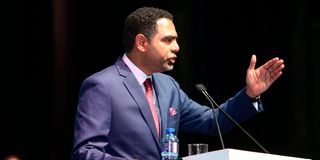
Football Kenya Federation president Hussein Mohammed.
Q: What has been your biggest challenge so far?
A: The biggest challenge at the federation for the past 10 years has been lack of credibility and transparency. These were governance and administrative problems.
Credibility issues have been raised time and time again, and the only way to fix it is to show our partners, third parties and the general public that we are committed to good governance, and having good structures at the federation to ensure we are transparent and accountable to Kenyans.
This is the only way we can moblise resources to invest in grassroots football. Now there are very huge expectations which we must live up to.
Q: What did Fifa President Gianni Infantino tell you when you met at the 2024 CAF awards gala in Morocco on December 17, 2024?
A: It was a very good meeting, and it took longer than I had anticipated, which is a good sign. From what I gathered, there was a lot of excitement about the new administration.
We talked about priority areas for Kenyan football, chiefly development of infrastructure. I was with my deputy McDonald Mariga in that meeting, and we talked about the importance of good governance. We agreed that Kenya needs to reclaim its status in regional and global football. We discussed football governance and infrastructure.
Q: How will you address match-fixing which is rampant in local leagues?
A: We must build capacity among our referees by giving them the requisite skills to enable them carry out their duties and functions professionally. We also need strong regulations to deter match-fixing, and engage lawmakers to pass laws that have punitive measures for such crimes.
At the moment, Kenya has no comprehensive laws to deter match-fixing in sports, particularly football. We must work with Parliament to ensure this is taken care of immediately.
I shall submit my recommendations to help improve an earlier draft that had been submitted towards this end. The other thing is to improve the referees’ welfare. We must improve their remuneration.
Q: What is the long-term solution to contractual disputes between local clubs and players?
A: We must protect the interests of both the players and the clubs. We must not discriminate against any group of people. Kenya Footballers Welfare Association (Kefwa) looks into the welfare of players and we shall work together with clubs to ensure that they have options for advancing their careers beyond playing football.
We have not done well in expanding the football ecosystem to benefit players beyond the pitch, but we were very deliberate in teaming up with Mariga, a former player who understands where the shoe pinches most. He has played football at the grassroots, in the local leagues, and at the highest level in Europe, so there is no better person than Mariga to help us find solutions to issues of player welfare with Kefwa.
We will hold financial literacy lessons for the players to help them better manage their finances, and to suggest better health insurance options for them.
Q: CAF Club Licensing was meant to ensure local clubs comply with modern football management, and that seems dead at the moment, isn’t it?
A: We have to be fair to our clubs as well, and consider the environment we are operating in. We have to improve our clubs, but let’s also be considerate. We can’t apply everything about club licensing at once, but do it over a period of time.
Local clubs need revenue streams to have competitive youth and women’s teams, and that needs sponsorship. We shall bench-mark with the best clubs in the world, but introduce changes progressively, otherwise we may overwhelm the clubs.
To get there takes dedication, commitment and consistency, and we shall do it gradually.
Q: What are your plans for women’s football?
A: Women’s football deserves more attention, and our Under-17 team has done well by reaching the 2024 Fifa Under-17 Women's World Cup. Many people don’t realise it, but it's easier to raise resources to support women’s football at the moment than men’s football.
Over the years, women’s football has been neglected, but now we have a competent Women Representative in Kerubo Momanyi, and we will have a dedicated office and secretariat for the development of women’s football. We have a two-fold plan.
First, we will set aside resources dedicated to women’s football and give it the attention it deserves. Secondly, we will build capacity in women’s football in terms of training more coaches.
We shall ensure teams tasked with managing our girls are professional, and that our girls and women have a safe environment to play football.
Q: Kenya women’s amputee football team did well at the 2024 World Cup with minimal support. What is your plan for football among people living with disability?
A: They say a society is judged by how it treats the elderly, and the disabled. We have not fully supported our teams competing in football for people living with disability both at the grassroots and at the national level.
Most of our match venues have no provisions for people living with disability to access them, so the conversation starts there. Making football inclusive is a top priority for FKF National Executive Committee.
Q: What do you want to be your legacy when you leave office?
A: It hasn’t crossed my mind. I just want to do my job in the best way I can to make the country proud of what we have built. Those after us will decide what our legacy is.
All we ask for is patience. I am happy there is a lot of goodwill from government, private sector, and fans, and I am keen on maintaining the momentum.

